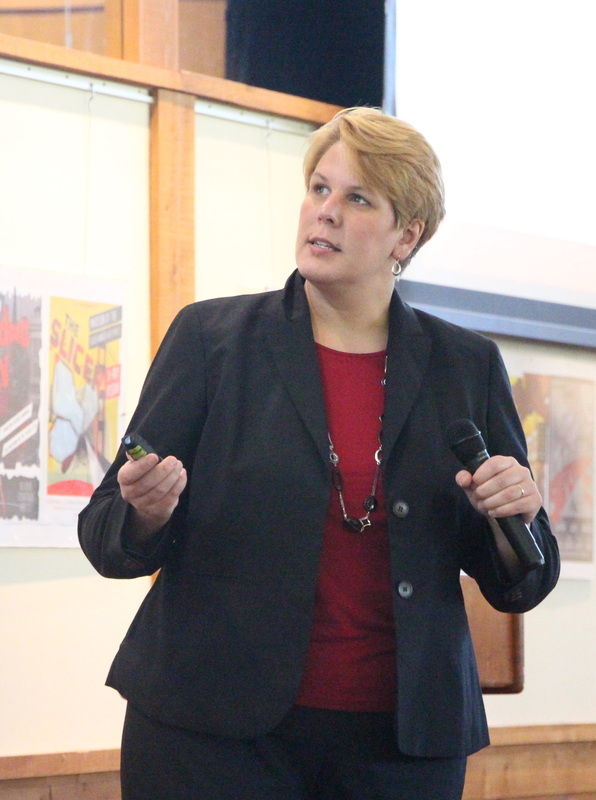Singing study makes progress in Parkinson’s patients
Elizabeth Stegemöller gives a speech on the research behind singing and Parkinson’s.
February 5, 2015
Dr. Elizabeth Stegemöller, assistant professor in kinesiology, had a lot of questions and very few answers.
Stegemöller wanted to understand how her two passions of music therapy and neuroscience correlated. When she realized there wasn’t any research on the subject, she dove into her own research study.
The purpose of Stegemöller’s research was to look for changes in voice, breath support and ability to swallow in people with Parkinson’s disease, a progressive disorder of the nervous system that slowly begins to affect a person’s movement. To do so, Stegemöller decided to organize singing groups comprised of people living with Parkinson’s.
Stegemöller organized four different groups for the study: one in Des Moines, one in West Des Moines, one in Waverly and one in Ames. Each group was run by a different music therapist. The Ames group, led by Stegemöller, met for one hour, once a week, for eight weeks at the First Baptist Church of Ames. Together, the study had 30 participants. Their age ranged from 40 years to 85 years.
Stegemöller found her passion for working with individuals with Parkinson’s disease during her graduate studies.
“I feel a very close fondness to those folks that I work with,” Stegemöller said. “They’re so genuine. They really care about the research and wanting to find a cure.”
The first step in getting the study off the ground was receiving a grant from the Parkinson Study Group. The preparation process for the research phase was a tedious one. It was about a year from the time that the Parkinson Study Group awarded Stegemöller a grant for the study to the time the singing intervention phase actually began. However, once the research phase started, the study continued without a hitch.
The singing intervention phase consisted of a pre-study test, singing intervention and a post-study test. The pre-test and post-test evaluated participants’ quality of life, as well as administering a vocal assessment that measured pitch duration and inspiratory and expiratory pressure, or the force with which a person can breathe in and blow out, as well as a swallow assessment.
Stegemöller was pleasantly surprised by the results of the study. Though she expected to see more vocal changes, such as speaking volume and a larger vocal range, the most significant changes were in breathing and swallowing measures.
“It was really awesome to me to see that the respiratory and swallow measures improved because those have the biggest impact on their health in the future,” Stegemöller said.
One of the leading causes of death in people with Parkinson’s disease is aspiration pneumonia. This is due to how Parkinson’s affects swallowing mechanisms and doesn’t allow the throat to close completely, which enables liquid to slip into the lungs undetected. The individual then can’t produce a forceful enough cough to expel the liquid, which leads to potentially fatal pneumonia.
Stegemöller’s findings showing that singing improves swallow function and inspiratory and expiratory pressure could greatly impact the Parkinson’s population by helping them prevent or fight off aspiration pneumonia more easily.
For the next step in her research, Dr. Stegemöller plans to conduct a follow-up assessment with participants to compare the progress of those who have continued singing to those who have not. She will also be working with collaborators in Florida and at John Hopkins Hospital in Baltimore, Md. to launch an expanded, multi-site version of her research.
Jackie Manatt found out about the study through an email and still sings with the group, even though the study is over. Though she believes singing has helped her voice grow stronger, she says that the relationships built between the participants has been one of the most beneficial parts of the study.
“We all have a lot of fun together, we respect each other and we all have something in common,” Manatt said.
Participants have not only bonded with each other, but also with Stegemöller. She said the most rewarding part of this process has been getting to know her participants.
“They’re just so supportive of me and what I do, and I want to help them as much as I can. They’re great people.”







